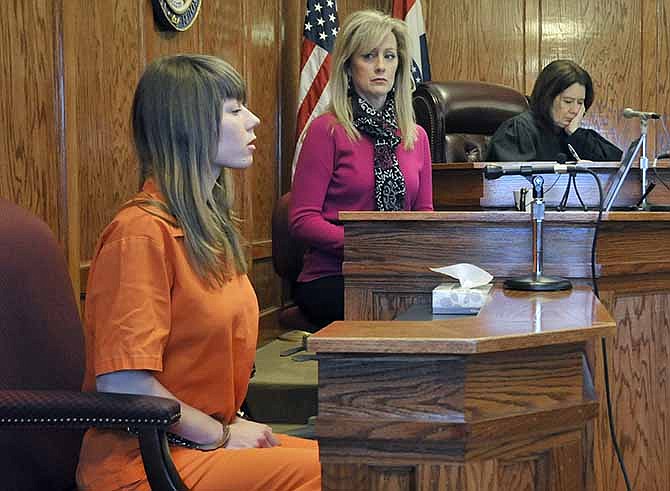Alyssa Bustamante said Thursday she decided to plead guilty two years ago - to killing Elizabeth Olten in 2009 - so she could avoid a mandatory sentence of life in prison, without any chance for parole.
But her new attorney, Gary E. Brotherton of Columbia, wants Judge Pat Joyce to overturn the 2012 guilty pleas and sentences, arguing that Bustamante's previous attorneys - Public Defenders Donald Catlett and Charles Moreland - provided the teen with ineffective counsel in advising her to plead guilty to second-degree murder rather than face trial for first-degree murder.
In an appeal filed in August 2012, Brotherton called the advice for a guilty plea a rush to
judgment, since Catlett and Moreland knew that the U.S. Supreme Court was considering cases that challenged mandatory life-without-parole sentences for teens convicted of murder.
Olten was 9 when she was killed on Oct. 21, 2009, and Bustamante was 15.
The teen was detained by juvenile authorities within two days of the murder, and was certified to stand trial as an adult within a month.
Just two hours after that certification, a Cole County grand jury indicted her on first-degree murder and armed criminal action charges.
State law says a first-degree murder conviction has only two possible punishments - death or life in prison with no chance for parole. But both Missouri law and U.S. Supreme Court rulings prevented the death penalty in Bustamante's case, because she was too young.
Three weeks before her trial was to begin, Prosecutor Mark Richardson on Jan. 9 offered to reduce the murder charge to second-degree with a chance of parole if Bustamante, then 17, would plead guilty and let Joyce decide the sentence.
Bustamante accepted the offer and pleaded guilty the next day.
After a two-day hearing in February 2012, Joyce ordered Bustamante to serve a life sentence, with a chance for parole, for her guilty plea to the second-degree murder charge, to be followed by a 30-year sentence for the armed criminal action conviction.
Bustamante - who turned 20 this past Tuesday - testified Thursday morning that Catlett and Moreland met with her "a dozen or so" times in the two years they had her case, and discussed both the facts of her case and her mental health history.
They also talked about the legal issues of her case, Bustamante testified, "but I didn't really understand the legal issues."
While she was in jail, Bustamante told Brotherton: "I slept a lot. I just wanted everything to hurry up, the process to be done and over with."
After getting Richardson's reduced charge offer, Bustamante said Catlett and Moreland told her "that I could go think about it - but the urgency they expressed made me feel like I couldn't."
She accepted the offer because "I was under the impression that that was the very best that I could hope to get - that it was to avoid the absolute certainty of life without parole."
Bustamante said she would have taken her chances with a jury trial, if she had known that a mandatory life-without-parole sentence was unconstitutional.
The U.S. Supreme Court made that ruling on June 25, 2012, more than two months after Bustamante's guilty plea.
Both Catlett and Moreland told Brotherton on Thursday morning they were aware of the federal cases and would have used a different trial strategy if the Supreme Court's ruling already had occurred.
But, with Bustamante's trial scheduled for the end of January, they didn't think they could wait - and they already had been overruled on their own motion challenging Missouri's mandatory life-without-parole sentence.
"If the case had gone to a jury, by far the focus would be on what happened to Elizabeth Olten," Moreland testified Thursday. "By having the sentencing hearing the way did, the focus - in at least a very small amount - shifted not so strongly on what happened to Elizabeth Olten, but on Alyssa Bustamante and who she was."
Moreland said he thought that was a better strategy "versus what it would have been before a jury that had spent a trial hearing all the evidence about Elizabeth Olten."
Catlett said the Public Defender System's Capital Crimes division - which usually handles death penalty cases - took Bustamante's case even though a death sentence wasn't possible, because the Public Defender's Cole County office was overburdened," and because "our office deals in almost all of our cases with those kinds of (mental health) issues" that were a key to Bustamante's defense.
Joyce gave Brotherton and Richardson a month to submit proposed orders in the case.
She either can reject Brotherton's motion, or set aside the guilty pleas and sentences and order a new trial.


